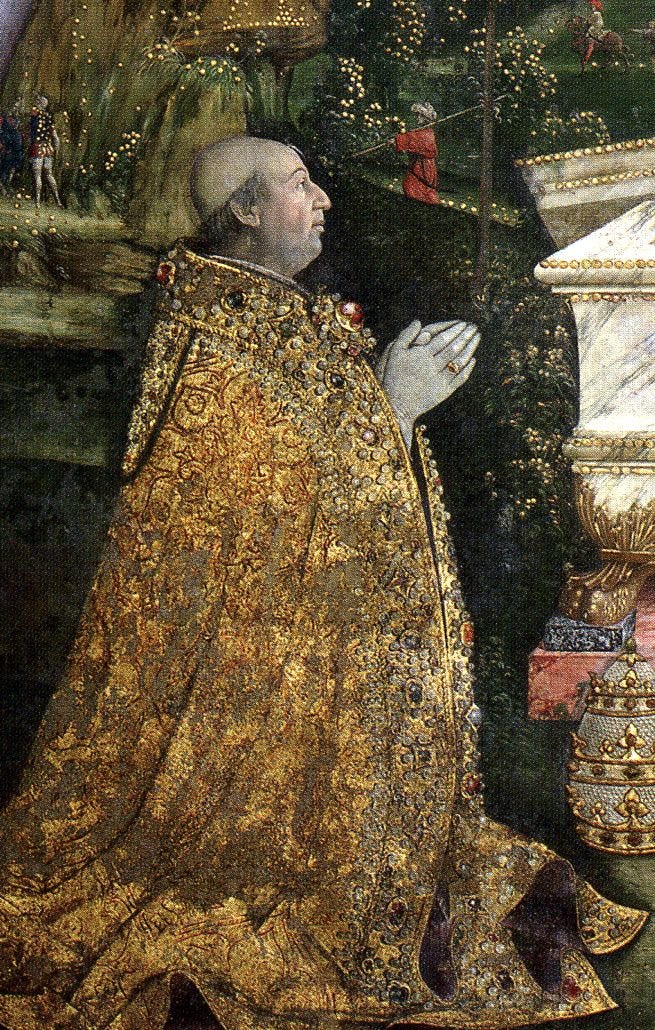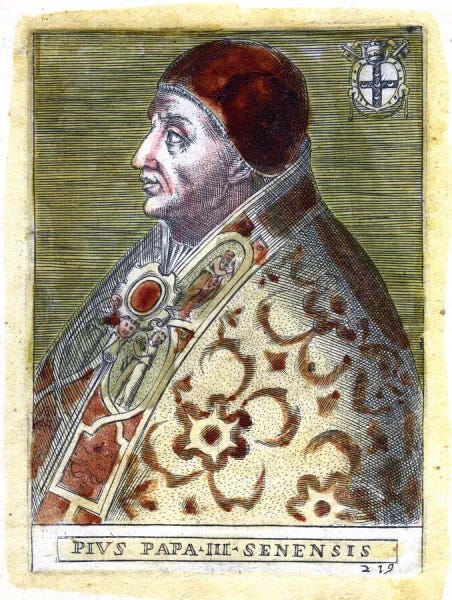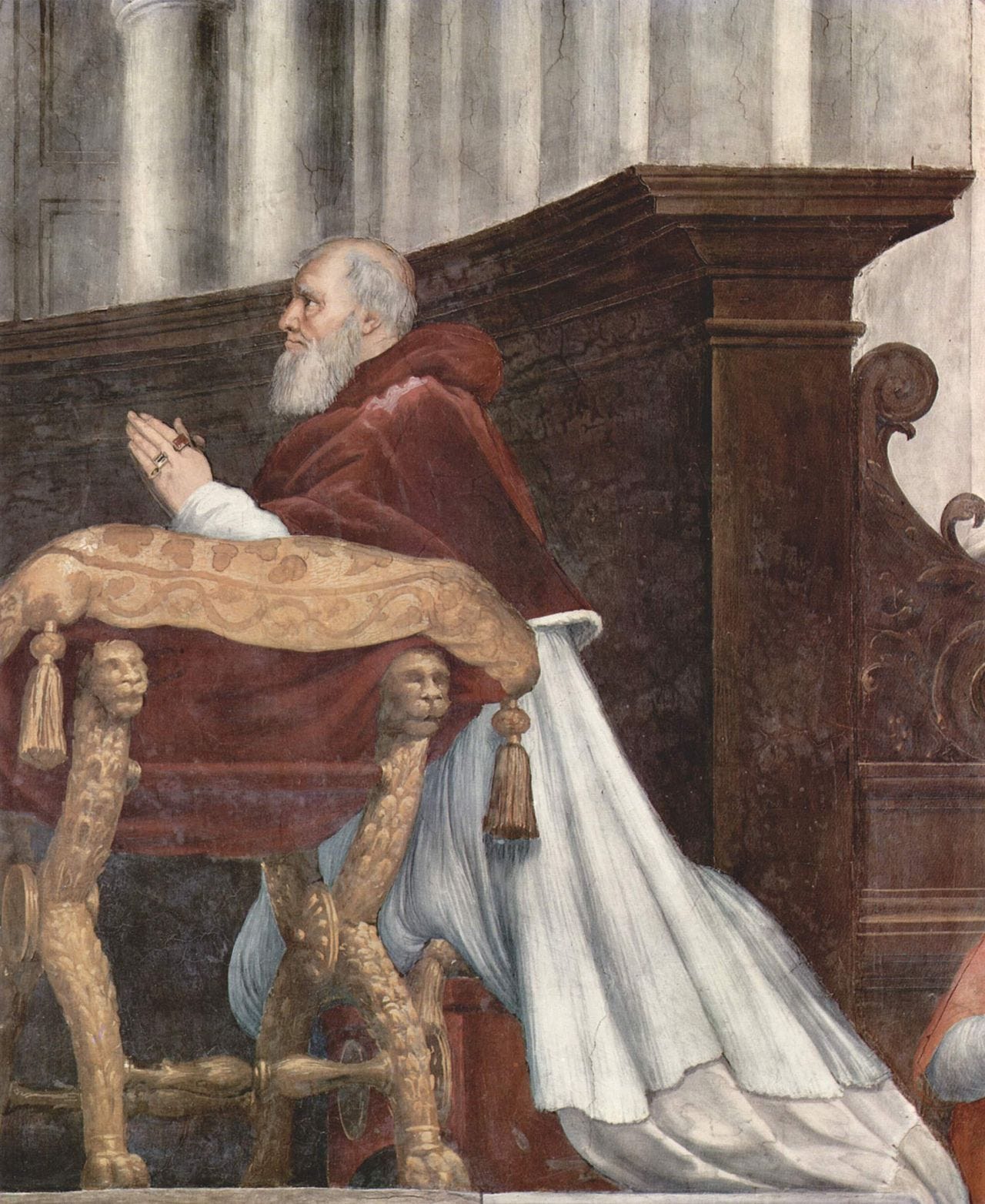The Year of the Three Popes
A year of two conclaves, 1503 gave us the end of the Borgias, the shortest papacy, the shortest conclave, and a new Caesar on throne
According to most accounts, shortly after Pope Alexander VI (Rodrigo Borgia) died on August 18th, in 1503, his corpse turned black. Since Cesare Borgia fell ill at the same time with similar symptoms, poisoning was rumored as the cause, although this is now dismissed in favor of malaria. In any event, the death triggered one of the more unusual years in papal history.
Much has been written about Alexander VI, and much of it is false. He was far from a model of the papacy, but the outrageous rumors of his licentious, murderous, depraved behavior are little more than lurid Roman gossip, enshrined in legend by Gregorovius, amplified by Burckhardt, and simply accepted by von Pastor. That many still retell them a century after Peter De Roo published five volumes of primary evidence proving much of it untrue doesn't speak well of many Borgia biographers. 1
He was certainly a schemer, but as a Spaniard his power base was fragile and Renaissance Italy a dangerous place. That he welcomed into Rome the Jews expelled from Spain and Portugal, giving them freedom to settle there and worship, is often left out of stories about the "monster of the Borgias." There is even reasonable doubt that he was Cesare's father. He was neither a good pope, nor a devil.
The end began on August 5th, when Cesare and Alexander attended a garden party at the vineyard of recently-elevated Cardinal Adriano Castelli d Cornetto. An outrageous story was invented that the Borgias had planned to poison Castelli at the party, but got the tainted goblets mixed up. Like a scene from a farce, one imagines Cesare whispering to Alexander, "The chalice from the palace has the brew that is true." That no one fell ill until a week later didn't slow the legend down at all: the Borgias had discovered an unknown, delayed-action poison, people claimed.
In fact, it was summer in Rome, there was a bumper crop of mosquitoes, and all indications suggest the Alexander, Cesare, and Castelli all contracted malaria. Courtier Johannis Burckardi (Johann Burchard), in his Liber Notarum, describes the end of the Borgia pope thus:
On Friday, the 18th, between nine and ten o'clock he confessed to the Bishop Gamboa of Carignola, who then read Mass to him. After his Communion he gave the Eucharist to the pope who was sitting in bed. Then he ended the Mass at which were present five cardinals, Serra, Juan and Francesco Borgia, Casanova and Loris. The pope told them that he felt very bad. At the hour of vespers after Gamboa had given him Extreme Unction, he died.
Frightened servants looted the papal apartment and fled into the night. Cesare was too sick to attend to matters, and delegated operations to his loyal deputy, Michelotto. Regardless, Rome came undone as the various clans, which had been kept in check by Borgia plots and force, erupted into riot, murder, and arson.
As for the blackened state of Alexander's body, it was the result of rapid decomposition due to heat and humidity, and the general chaos that prevented the body from being properly prepared. It was also dropped as monks carrying the coffin started fighting over candlesticks. In the end, it had bloated so much the coffin could barely be closed.
The Cardinals were poised to begin a conclave, but Spanish and French armies were parked outside Rome, and the city was controlled by roaming mobs. The Orsini and Colonna families were preparing to fill the power vacuum, and Cesare was still occupying the Vatican. No one would move until Cesare was dealt with. After negotiations, he agreed to leave the city, and the cardinals could get down to their work.
Pope for a Month
At 26 days, the reign of Pius III is one of the shortest in history, but it's even shorter when you allow for the gap between election and assuming the see. With his coronation on October 8 and his death ten days later, no one sat on the throne for less time.
The nephew of Pius II (nepotism, literally the favoring of nephews, is another proud Catholic invention) was made Archbishop of Siena at age 21 by his uncle, even though he was only as deacon at the time, and eventually rose to the College of Cardinals. Pius II and III were of the Piccolomini family, patricians of Siena who suffered the vicissitudes of Sienese politics: now in, now out, now rich, now not. Their power base in Rome was modest, but they did manage to produce two popes.
Silvio (Pius II) rose in power through his skill as a poet, intellectual, diplomat, and courtier. By the time the path to the See of Peter was clear, his nephew Francesco (Pius III) was older and sickly. Rome was in a bad way after the death of Alexander. Cesare's forces, as well as those of France (Louis XII) and Spain (Ferdinand II), controlled the area around the city. Thirty-nine cardinal electors entered this wasp's nest, with world powers each promoting their favorites, among them Cardinals Giuliano della Rovere and Georges d'Amboise, along with Francesco. Cardinal Ascanio Sforza, imprisoned for plotting to depose Alexander VI, was released from prison to vote, and found the crowd calling for his election.
How did Francisco even wind up a candidate amidst this brood of vipers? Strangely enough, because of his holiness and skill. He was respected for his faith and spirituality, and had proven himself an able diplomat. When none of the power players could reach the right number of votes, the weight shifted to the most honorable among them after d'Amboise threw his voting block behind Francisco.
Pius III was elected on September 22 in 1503, a good and gentle man wholly unsuited for such a time. His reign was assumed to be a little more than an interregnum: a time to take a breath from the endless warring before the daggers were once again unsheathed. Believing Cesare was sick, Pius allowed him to return to the city, where the Borgia prince took up command of his forces.
The ceremonies following the election of Pius were curtailed for his health, and he never really held the reigns of power, dying on October 18th. It's one of the sad what-ifs in church history, since Francesco was a wise, skilled, and holy servant of the church, and even a few years of his leadership might have made a difference.
The Shortest Conclave
The vacant see meant it was time for della Rovere to take the stage. In the month after the conclave, he met with Cesare and the Spaniards, offering to leave him in command of the papal armies and with his possessions. He also negotiated with d'Amboise, who decided della Rovere was preferable to any other options. A unanimous vote was locked in the night before the conclave. The only vote he did not receive was his own, since cardinals cannot vote for themselves. He was so certain of the vote that he chose his regnal name and had his papal rings cast before it was even taken.
Lasting ten hours to observe the formalities, it is the shortest conclave on record. None of the cardinal electors really had much choice going into the conclave. The French forces had withdrawn, the Spanish were in disarray, and the papal treasury was empty.
Although he was born Giuliano, it has always been assumed that he chose his regnal name of Julius II after Julius Caesar, and his reign (which lies outside the scope of this piece) did nothing to disprove that. His ten years on the throne were the most eventful in the history of the papacy. He increased the power of the Papal states and the authority and influence of the papacy itself, convoked the Fifth Lateran Council, started rebuilding St. Peter's Basilica, established the Vatican museums and the Swiss guards, commissioned masterpieces from the great artists of the day (including the Sistine Chapel), created the first dioceses in the New World, and commanded troops in battle.
Cesare's deal was short-lived, and Julius set about blackening the Borgia name, refusing to live in his apartments and doing all he could to undercut the family's power. Julius ordered the Borgia Apartments, fabulously decorated with frescoes, sealed off and the frescoes covered, and they remained so for almost four centuries. Cesare was vulnerable without papal patronage, and spent the remainder of his life found alternately imprisoned or leading forces in battle before finally dying in an ambush in 1507.
Julius II, his power secure, set about reasserting papal authority. He was called Il Terrible, and although that's literally "The Terrible," it conveys something more akin to a force of nature. He was conniving, unscrupulous, bad-tempered, and violent. He was also brilliant, decisive, frugal, and the consummate man of his times. His holiness--good, bad, or indifferent--goes largely unremarked-upon by his contemporaries. If you believe the pope should be a worldly leader wielding the power of his office to shape his times (often for the good), then it was a shining moment in the papacy. If you believe the pope should be a spiritual leader and that such traffic in the times can only corrupt the Vicar of Christ, it was a disgrace.
In truth, it was probably a bit of both.
When author G.J. Meyer (The Borgias: The Hidden History) went to examine De Roo's books at Oxford's Bodleian Library, he found that none of the pages had ever been cut, meaning that from their publication until 2010, the largest source of primary material about Rodrigo and family had never been consulted at Oxford.









I too have been teaching my students about the “year of three popes”—meaning of course the most recent such year, 1978! To them, almost equally ancient history, although it helps when I tell them that Star Wars was the year before, Superman was that year, and Alien was the following year. (Very few of them have seen Superman, but I mention it anyway.) Much less sordid history, even if the actual history of 1503 is less sordid than it is often remembered, as helpfully documented here!
Nepotism is as old as the hills. The Church invented the term because, for the first time, it was regarded as something wrong. Prior to this, a man putting all his relatives in high position might arose envy but not indignation.